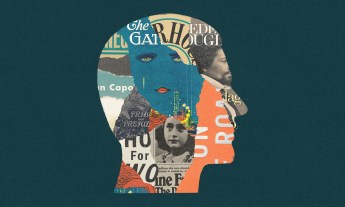
By spotting and changing a few bad habits, you can easily increase your reading speed without missing out on detail, says Jordan Harry.
This post is part of TED’s “How to Be a Better Human” series, each of which contains a piece of helpful advice from someone in the TED community. You can browse through all the posts here.
Have you ever wished that you’d come down with a non-serious, non-painful illness or injury so you could stay home and get all your reading done?
No, your solution is not to catch a cold; it’s speed reading, says entrepreneur Jordan Harry. This ability can enable you to read much faster without losing detail.
As a child, Harry didn’t enjoy reading. He says, “I used to have a speech impediment, and because I couldn’t pronounce the words, I couldn’t understand them. My reading speeds suffered. Before I knew it, reading was my biggest fear.”
After speech therapy and plenty of practice, Harry’s reading speed picked up — and then it took off. Today he can read 1,500 words per minute (the average person reads between 200 and 300 words per minute), and he’s taught his methods to people around the world. “Speed reading isn’t this superpower which only the very few of us could have. Like any skill, it can be learned,” says Harry, CEO of UK-based training provider StudyFast.
Harry has identified three habits that can slow us down. He had them, and many of us do, too. However, once we recognize them and know what causes them, we can overcome them. He says, “There is no such thing as a bad reader, just those with bad reading habits. Once you know what habits are holding back your reading speed, it’s a lot easier to read faster.”
The first bad reading habit is subvocalization. “It’s that little voice in your head you use from time to time when you read. From a young age, many of us are taught to read aloud, and as we progress, we then read inside our heads,” Harry says. Often, we might not even be aware we’re doing this.
Why is this a problem? Because people’s average speaking speeds are 100–160 words per minute, our reading speeds consequently suffer. “If we want to read faster, we must start to see the words as opposed to hear them,” says Harry.
How to change it: One quick trick from Harry is to press the tip of your tongue to the roof of your mouth as you read. He says it will prevent you from unintentionally mouthing the words and also provides a distraction for your brain.
You might also try listening to classical or instrumental music while you read. This can help mute your reading-aloud inner voice and puts you in a state conducive for engagement.
The second bad reading habit is regression. No, this isn’t about your fondness for young-adult novels or comic books; those are absolutely fine. According to Harry, regression is when you get to the end of a page or halfway through an article and realize you haven’t taken in what you read. Or you come across a particular person or term and can’t remember them at all. You end up having to go back and start all over. This can happen over and over and over again. The reason for this isn’t a lack of understanding, says Harry, but a lapse in concentration. Even though we think we’ve been diligently reading, we’ve become distracted.
How to change it: You can start by reigniting your interest in what you’re reading. “When our brain wanders, it’s because we’ve become passive. We need to be curious,” says Harry. Get actively inquisitive — tap into your inner curious kid, the one who demands, “But what does that mean?” and “Who’s that?” Other questions recommended by Harry are “What am I looking for?” and “What key words and figures do I need to find?” You might also check in every few minutes and simply ask yourself, “What have I learned so far?”
Another method for tackling this problem is called gliding. Using an object like a credit card or an envelope, cover up sentences as soon as you read them; move the shield down your page (or device) as you progress. Harry says, “The great thing about gliding is it removes your safety net to re-read the sentence you’ve just read — meaning you’ve got to pay attention to the sentence you’re reading because you know there’s no way you can go back.”
One final strategy is external — choose surroundings that will allow you to concentrate when you read. For some people, this could mean places with library-like silence. But if that doesn’t work for you, Harry suggests trying a coffee shop where other people are working. Many cafes, he says, “have learned to create an environment which is optimum for productivity — not too loud, where you get distracted by what’s going on around you, and not too quiet, where your brain begins to wander.”
The third bad reading habit is fixation. Fixations are the points on the page or screen our eyes alight on as we read; we can end up inadvertently lingering on random spots, which impedes our speed.
How to change it: Harry suggests using a pacer — a tool to point at sentences as you read them, which can train your eyes to keep moving. It could be your finger, a pen, even your cursor. This has two main benefits, says Harry. “One, it maintains our reading speed. Often, when we read, we don’t realize how fast or slow we’re reading until it’s too late. Number two, it increases and encourages our eyes to read faster because we’re forced to read an accelerated way.”
By deploying these habits and using some other shortcuts he’s learned (which he shares in his TEDx talk), Harry now reads a book a day. He’s keen to help everyone become quicker readers — a critical skill to develop in our information-packed world.
But he wants people to know that speed reading is “a superpower which you can turn on and off.” In the same way that you change your walking speed given the context — you’ll stroll in a park and race-walk to reach the supermarket before it closes — you should adjust how you’re reading depending on whether it’s for enjoyment or for need. So, when you’ve settled in to consume whatever it is that you read for pleasure, take some time to savor it.
Watch his TEDxBathUniversity talk here:














